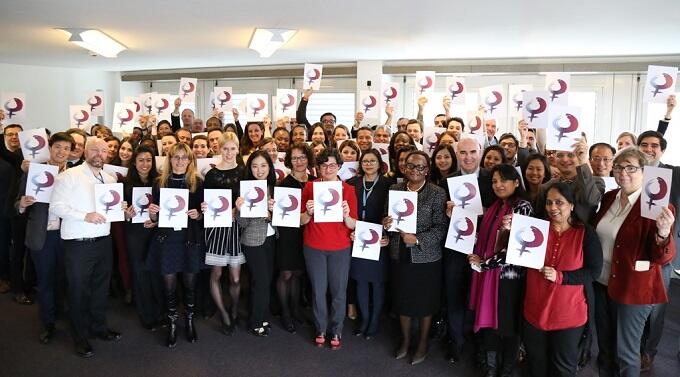
Curbs on women entrepreneurs create ‘big missed opportunity’, ITC chief says
Any barrier that serves to curtail the involvement of women in the workplace is not only an injustice to half of the world’s population, but it’s simply bad business, says Arancha González, executive director of the International Trade Centre (ITC).
Yet more than 120 countries apply legal restrictions that prevent women from holding certain jobs – just because they’re women – even though countless studies show that companies which are diverse in terms of gender are more productive and more profitable. Failing to correct this situation is a ‘big missed opportunity’, González said, which is one reason ITC supports women entrepreneurs through programmes such as Netherlands Trust Fund III (NTFIII).
‘Studies show that bringing women into the economy more fully – and it’s estimated to be around 1 billion women as consumers, producers, investors and entrepreneurs – would be the equivalent of adding a China or an India to global growth,’ she said. ‘There are plenty of excellent women for almost any position that we have to fill, for any profession or for any activity.’
‘There is not just a question of social justice, but also a question of very clear economic interest for any economy around the world,’ she added. ‘It’s a universal agenda; this is why we have been pushing for this economic empowerment to be a centrepiece of the 2030 sustainable development agenda.’
Laws that limit women ‘must be put under the spotlight’, González said. ‘We have to identify these laws, identify the countries that have these laws, and little by little remove them.’
This is a slow process, she says, because such laws tend to be linked to social norms and traditions – which González identifies as the main culprits deterring women from seeking jobs in male-dominated fields such as the fast-growing information and community technology sector. In many cultures, ‘women don’t dare, because it’s not the social norm that they dare’, she explained. ‘This you don’t change with the law – you change this by changing the vision and the values that people have. That takes a little bit more time. We have to treat this through education, with examples, with explaining why’ change is critical.
This is why ITC decided last year to include a Tech Challenge at last year’s Women Vendors Exhibition and Forum. With technology companies such as Google and CI&T saying they want diversity but can’t find graduates, the Tech Challenge underscored that ‘women can find a place, a home and a job in technology’, González said. Two Kenyan female entrepreneurs who are also beneficiaries of NTFIII programme won the top prize, beating out men and women from all over the world and demonstrating that ‘women can also be the best in technology’, she said.
NTFIII builds export sector competitiveness in the IT and IT-enabled services sectors in Bangladesh, Kenya and Uganda and – within its mandate to help small and medium-sized enterprises (SMEs) in developing countries to internationalize – empowers women entrepreneurs. Having programmes such as NTFIII that are devoted to supporting and building the capacity of female entrepreneurs enables ITC to embed the ‘women dimension’ in all parts of its work, González says.
‘SMEs that trade are more productive, more competitive, pay better salaries and are more profitable,’ she said. ‘About 40% of SMEs are owned by women, but only one-fifth of the SMEs owned by women participate in international trade. The logic is that if we want more growth and more inclusive growth, it’s about women’s economic empowerment. This is the line of reasoning for us to now make sure that 40% of our interventions have women as a focus.’
NTFIII’s specific emphasis on promoting services exports underpins this goal, according to ITC’s executive director. ‘Services have three characteristics that make them particularly attractive for women: they grow faster than trade in goods, profitability and innovation. These three elements, which are particularly strong in the IT sector, have a big innovation component, a big creativity component. We shouldn’t shut off an entire sector to women.’
It’s the success stories that take shape under programmes such as NTFIII that show progress is being made, even if that is happening with baby steps, González says.
‘I am not foolishly optimistic, but I see progress,’ she said. ‘What we have to do better, which maybe we’re not doing, is capturing the progress that is made, so we have a story to tell. We have to say here are five people that have made it, to show a bit that there is progress.’
This trend will accelerate as leaders seeking to shore up their economies grasp the value of bringing more women into the workplace and work harder to chip away at cultural barriers to female employment. It is what González calls the ‘economic argument’ that will ultimately spur change.
‘Wherever you make the economic argument, people listen,’ she explained. ‘Ministers listen, prime ministers listen, because they all need to create jobs, they all need to foster growth. I don’t make this an ideological battle, but I just happen to think that by making the economic argument, it’s easier to bring people around to the idea that they have to give equal opportunities in the economy. Once you do this, it’s difficult for women not to have equal opportunities in society.’



